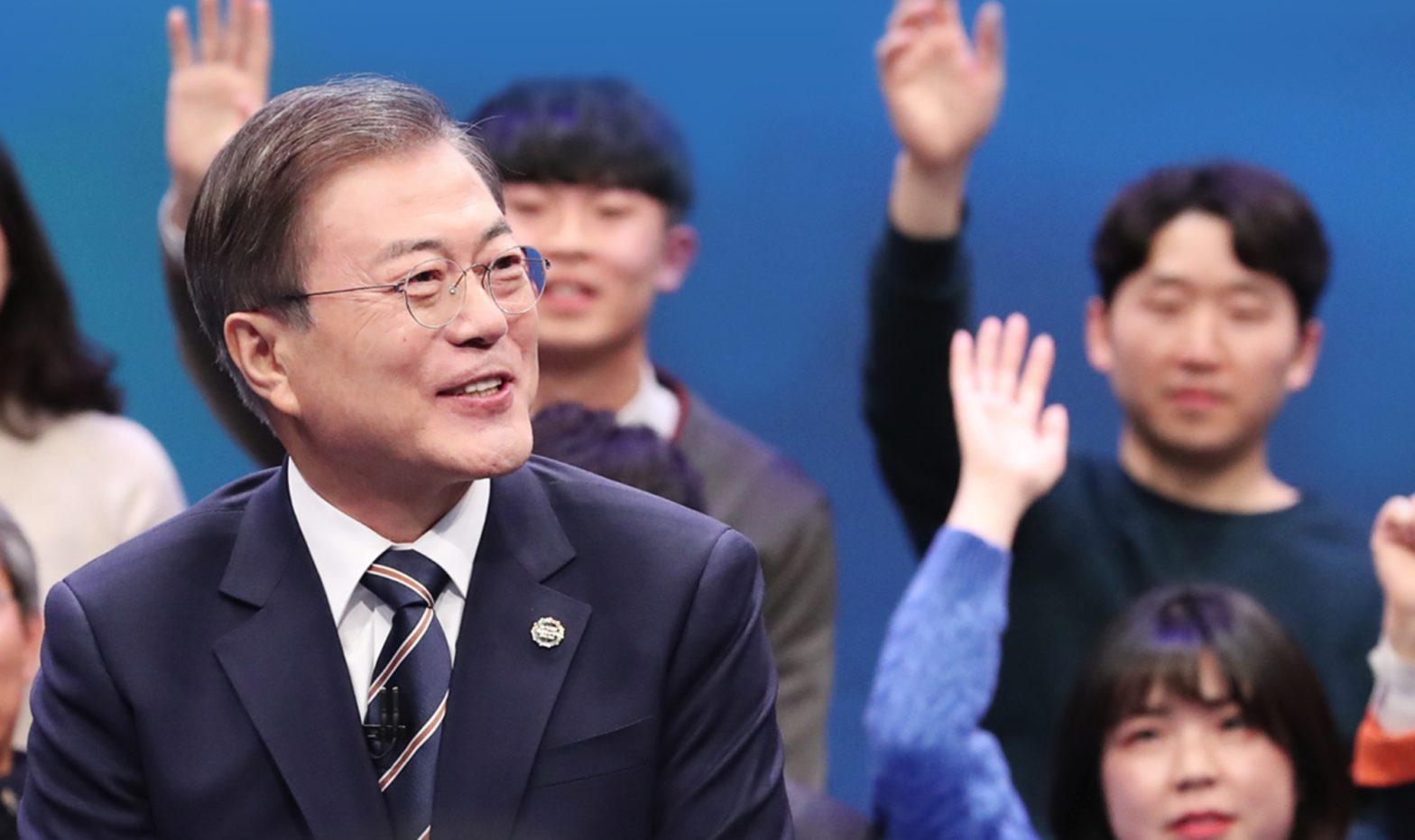Moon is the most popular prez ever, but what legacy will he leave?
President Moon is the most popular President in the history of the Sixth Republic of Korea.
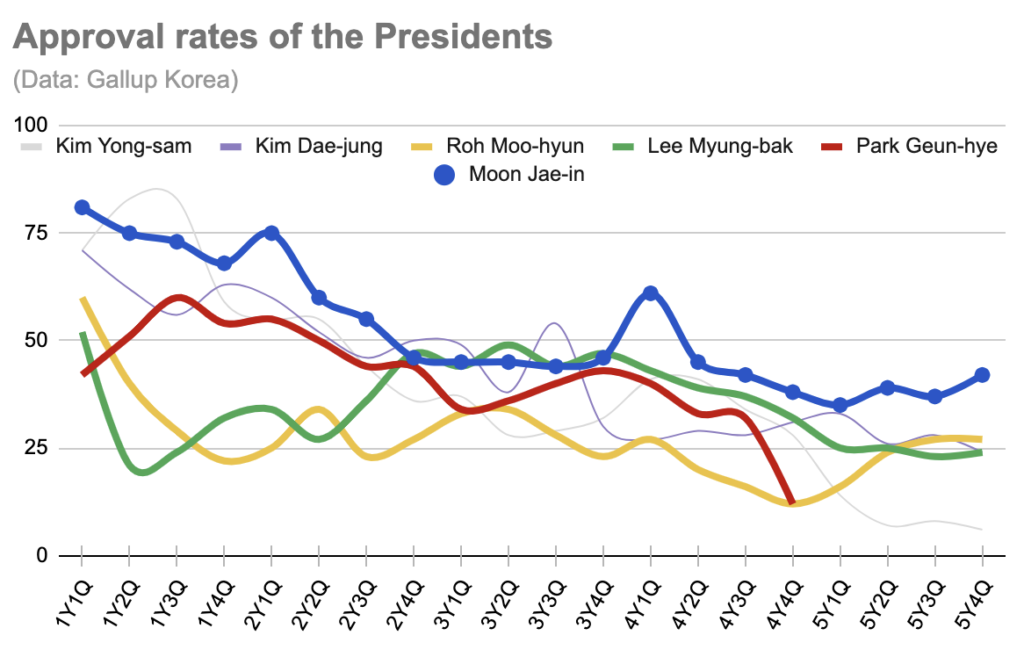 This statement, however, makes heads tilt rather than nod. Questions like the below would likely follow:
This statement, however, makes heads tilt rather than nod. Questions like the below would likely follow:
- Is Moon the most successful President?
- Did his party win the next presidential election?
- What are Moon’s achievements?
- Did North Korea come closer to denuclearization?
- Did inter-Korean relations improve?
- Did South Korean democracy improve under Moon?
- Did the South Korean economy improve above the baseline?
- Is inequality reduced?
- Is COVID-19 curbed effectively?
I can’t give any positive answers to those questions but the COVID-19 one. The questions about the economy may take more time to answer, but I can assuredly say that South Korean democracy has been eroded in many ways under Moon.
How could Moon have been so popular, then? One media pundit aggregated theories:
Famed media/politics critic Kang Jun-man attempted to solve this mystery by listing 10 possible reasons for the high approval rate: https://t.co/gVYEwZHa2i Highly recommended even though it’s written in Korean.
— Subin Kim (@SubinBKim) March 11, 2022
Imagepolitik
Kang recently delved deeper into Moon’s imagepolitik via Tak “Blue House’s Goebbels” Hyun-min, who’s been orchestrating all the major Presidential events during the Moon administration.
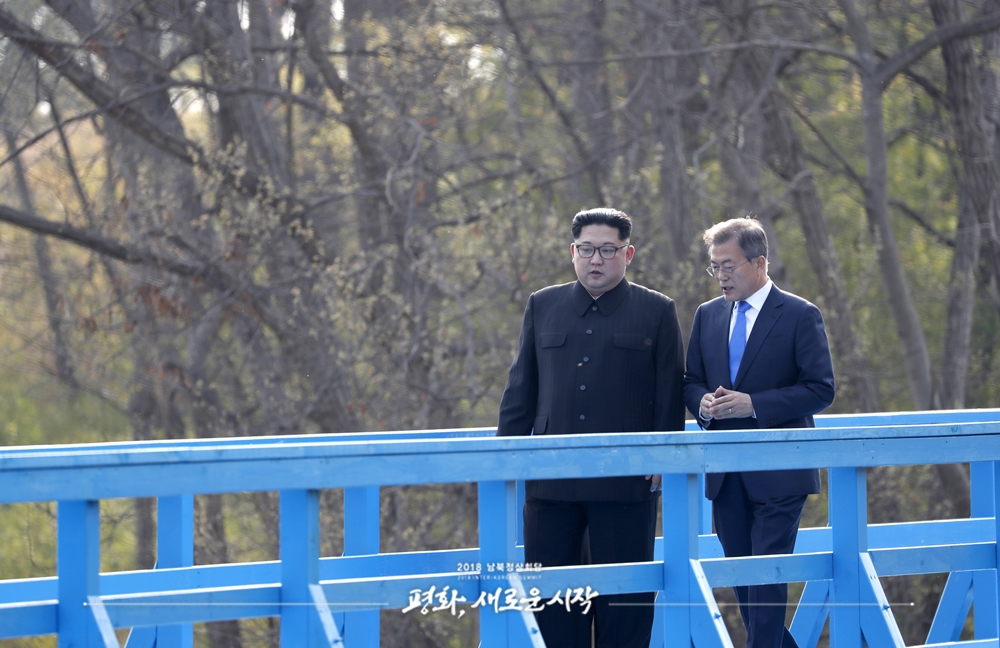 <figcaption>Without a doubt, Tak’s best manipulation by far</figcaption>While Kang focuses on Moon’s (and his fellows’) self-righteousness and arrogance behind his imagepolitik, I’d like to look at his supporter’s side: what’s behind their everlasting support for Moon?
<figcaption>Without a doubt, Tak’s best manipulation by far</figcaption>While Kang focuses on Moon’s (and his fellows’) self-righteousness and arrogance behind his imagepolitik, I’d like to look at his supporter’s side: what’s behind their everlasting support for Moon?
Generation gap
One protruding feature of Moon’s concrete support, the term local newspapers favor, is that it’s solid among those in their forties.
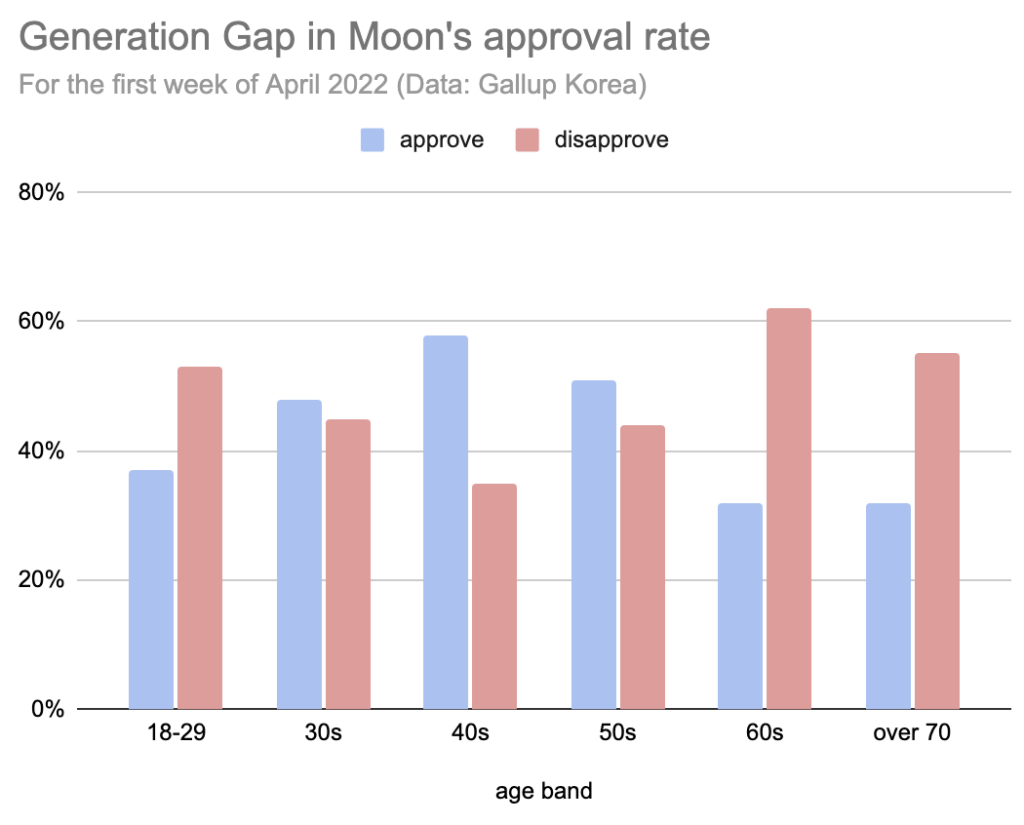 Journalist/researcher Cho Gwi-dong, whose analysis of Korean politics through the lens of economics is one of the best in the nation, points out the forties are the last ones who occupy the upper side of the dual structure of the Korean economy—mainly consists of export-driven conglomerates and juicy public institutions.
Journalist/researcher Cho Gwi-dong, whose analysis of Korean politics through the lens of economics is one of the best in the nation, points out the forties are the last ones who occupy the upper side of the dual structure of the Korean economy—mainly consists of export-driven conglomerates and juicy public institutions.
They also managed to invest in houses with high leverage (jeonse system is vital in this case, which allows investors to purchase a home with a fraction of cash—so-called gap investing갭투자) during the previous administrations, which contributed a lot to their wealth after Moon kicked the ladder away by tightening the regulations.
Plus, many of Moon’s welfare policies target those who already have children, which also benefit the forties the most, Cho argues.
Quasi-religious character
Another theory I’ve kept to myself is that Moon’s support has a quasi-religious characteristic.
In other words, a cult of personality.
There is one thing I most often heard when I talked to those who say they support Moon. They, of course, don’t agree on everything with Moon. Some of them suffer from Moon’s policies—especially when they try to buy a house. They sometimes confess they are angry because of it.
“But I still like Moon as a person. His guys are doing it wrong,” they say.
Maybe he’s a good person. But this has nothing to do with whether he’s doing an excellent job as the country’s political leader.
Partly it’s because of his imagepolitik. As Kang pointed out, Moon has been shrewd in standing in the forefront of good news and dumping breaking bad news bad on his subordinates.
However, I can’t help but think this cult of personality is one of the core elements of the secular religion for the middle-class Korean. Its greatest myth is that of martyrdom, and its most prominent martyr is Roh Moo-hyun.
(By the way, I think the middle-class secular religion is a global phenomenon, not just confined to Korea. It seems that the human mind improvises whatever it can find to fill the spiritual void. Let me just add that South Korea happened to have no serious racial issues so far.)
This is well reflected in Moon administration’s policy goals. For example, one of the first things Moon pursued after he set foot in the Blue House was to reopen the criminal investigations targeting the former President Lee Myung-bak, whom Roh and Moon followers believed to be the Pontius Pilate.
When the ruling Minjoo Party achieved an absolute majority in the National Assembly, they spoke of reforming the Prosecutors and the media, which, they believe, played a significant role in the crucifixion of Roh.
Even some Minjoo insiders think it is too much. A prominent 86 generation politician Kim Young-choon, who announced his political retirement weeks ago, said “now it’s time for the Minjoo Party to break free from the trauma of Roh’s death.”
It could be said Moon was Roh’s shadow as Park was her father’s. This may be the origin of their oft-mentioned similarity.
What will be Moon’s legacy?
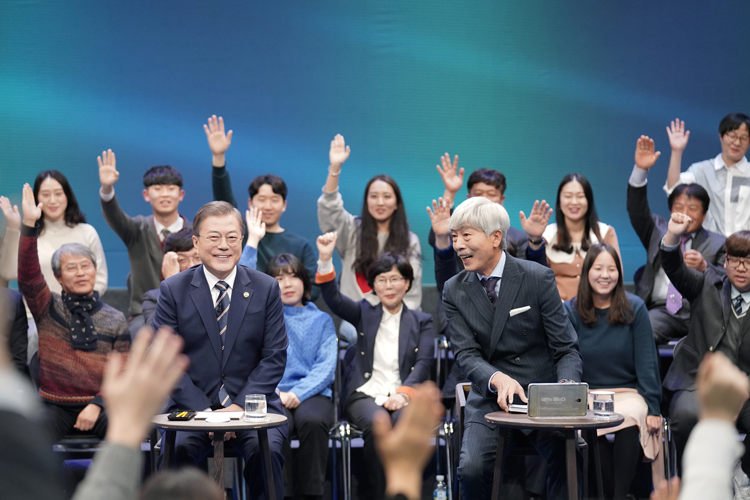 The approval rate of over 40% even in his last days in the office is really a feat for a ROK President.
The approval rate of over 40% even in his last days in the office is really a feat for a ROK President.
But what’s it really worth if it doesn’t translate into any meaningful political outcomes?
Since the birth of the Sixth Republic in 1987, both conservative and progressive parties succeeded in extending their hold on the Presidential Office once. So-called ten-year cycle.
Considering that an incumbent President often suffers from a low approval rate in their last days in the office, this meant they were capable of discovering and nurturing, at least once, an alternative group within. During the last days of Kim Dae-jung’s term, Roh popped out as a fresh alternative and Lee and Park had been competing against each other for years.
Moon and his Minjoo Party were the first to have fallen short. Winning the absolute majority in the Assembly on the top of the presidency may have been poisonous.
A cult of personality runs by zealots. The zealots quickly turned into a mob, attacking minority voices that were critical to the majority line. Some left the party and those who remained failed to offer an alternative to the voters for fear of sacrilege.
Who’s going to succeed Moon? The most significant problem for Moon is that he doesn’t seem to have a successor. There was a time when there were several would-be successors, but they are all gone now: some went to jail and some literally gone.
Will Lee Jae-myung be one? It is doubtful that Lee can survive multiple investigations which are now getting traction as the election’s over. Even if he survives and wins in the next race, it’s not likely he will succeed Moon as Roh succeeded Kim. It will be more like Park who ousted Lee. (It is no secret some Moon supporters voted for Yoon because they thought Lee would be much harsher to Moon than Yoon would be.)
Online-based mobocracy via a cult of personality will be the brightest legacy of President Moon. The embryo had been there long before Moon: Roh Moo-hyun was probably the world’s first politician who had an organized fan club, which was the basis for Moon’s emergence as a politician.
But Roh had his own vision and guts to defy his own supporters. Those who lived through his days will clearly remember the massive outcry when Roh pushed ahead with the KOR-US FTA. Although free trade agreements are Korean leftists’ horror—especially if it concerns the US—Roh thought it was so important that it couldn’t be dragged out for fear of losing his political support.
Moon has none of his predecessor’s qualities. Even with his miraculous popularity, Moon and his party have done nothing on those that might irk some of their supporters, including the pension system reform (one column says it was the first administration that didn’t even try) and the anti-discrimination bill.
Or it was the secret of his popularity.
